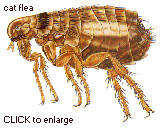Those Annoying Little Fleas

I know I'm a little late considering how little is left of the summer. I've been trying to write this for at least a month.
I'm really looking forward to frost this year. Why? Because I'm tired of the fleas. Usually fleas are a fall problem in this area. Ticks are the spring problem. This year the fleas arrived in April and have been here all summer long.
So what are fleas? For those of you who've never seen a flea, they are small, about double the size of a poppy seed, brown and thin.
Flea eggs are white and about the size of a grain of sand. Female fleas lay eggs while on your pet and fall off wherever your pet happens to be at the time which is why stray cats and other wild animals can spread fleas and deposit eggs in your back yard. Eggs usually hatch in 1-10 days depending on the temperature and humidity. It's been humid this summer; therefore we have more fleas (and mosquitoes but that's a different article). Temperatures below 65F and humidity below 70% slow down the growth of fleas. Flea eggs can be dormant for 7 months in a humid environment.
One female flea can lay 40-50 eggs per day and over 2000 eggs during their life.
Between hatching and becoming adults, fleas go through a larval stage, like butterflies do. Also like butterflies, they pupate and become adults.
Fleas consume 15 times their weight with every blood meal. A heavy infestation of fleas could consume 10% of the blood volume of a 1# kitten in a day making that kitten severely anemic in only a few days.
The majority of blood consumed is passed out in their feces, also known as flea dirt, that serves as food for flea larva in the carpet, the yard and the bedding where your pet sleeps.
Fleas also carry diseases like blood parasites for dogs and cats, the bubonic plague that ravaged Europe centuries ago and tapeworms. Pet can also be allergic to flea saliva. Sometimes even one bite can send them into an itching frenzy.
Frost will kill adult fleas (but not the eggs) outside but the ones in your house will continue feeding and reproducing.
Steps for flea control:
Treat your yard- contact your local exterminator for recommendations and/or service.
Treat your house: most OTC products are useless. We do have a spray that works well or you could contact an exterminator. Vacuum your carpets at least once a week to remove eggs, pupa's are sticky and don't come out of carpeting so easily.
Treat your Pets: most OTC products are useless; most products that have been on the market over 10 years are useless. Treat all dogs and cats that come in and out of your house. This includes making sure your friends pets that come and visit don't bring fleas with them and if you've already got fleas and they don't, advise them not to bring over their pets until they have been treated with some sort of flea control for 24 hours. Rotate flea control every year or two to prevent the fleas from becoming resistant to the insecticide.
Fleas across McCook are hit and miss. I have a neighbor who has fleas but so far I don't. Parks are places where you might find fleas but since the city may spray for insects, fleas maybe covered there.
Shampoos are good for a quick kill but have no long-term residual protection.
Flea collars, the good ones, are getting harder to find. If you do get a good one, the extra at the end when you cut it to fit your pet, place it in the bag or canister of your vacuum to kill any fleas and eggs that get vacuumed up.
Fleas prefer to be on animals but if there isn't one available, they will choose the next best thing, you. Do not apply flea control to yourself or your loved ones. Flea control is meant for animals, not people. Be sure to read the label, some products are not for young puppies and kittens and some are not for cats period.
Flea combs are an inexpensive essential tool for finding fleas and flea dirt. To check for fleas, comb the hair on the back and near the base of the tail of the animal to check for live fleas and flea dirt. If there are brown specs that turn red when water is applied then there are fleas in and around your house. Live fleas will hop around and can jump up to 9 feet. For every flea you see there will probably be a dozen more.
For More Information: http://www.capcvet.org/recommendations/fleas.html
-
-- Posted by PaulSutton on Sat, Nov 25, 2017, at 12:20 AM
Posting a comment requires free registration:
- If you already have an account, follow this link to login
- Otherwise, follow this link to register

